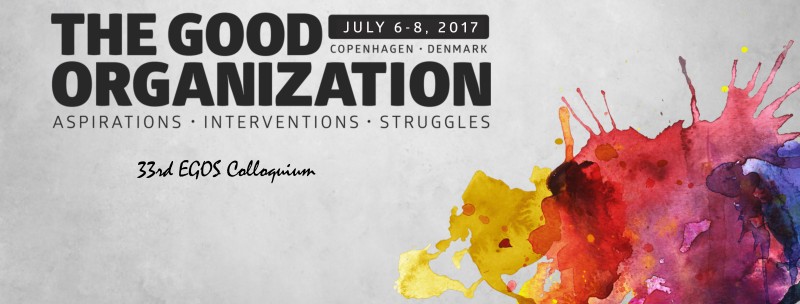Sub-theme 04: (SWG) Long-shots and Close-ups: Organizational Ethnography, Process and History
Call for Papers
In recent decades, organizational scholars have set out to explore the processual character of organizations. They have
investigated both the overtly ephemeral and sometimes dramatically unstable aspects of contemporary organizing and the social
flux and flow of everyday organizing hiding beneath organizations’ stable surface appearances.
In the EGOS
Standing Work Group (SWG) 04 on “Organizational Ethnography” we want to discuss the use and usefulness of an ethnographic
approach to studying organizational processes. Ethnography is claimed to be sensitive to both historical context and the micro-dynamics
of organizational life (Bate,1997; Ybema et al., 2009). Van Hulst, Ybema and Yanow (forthcoming) argue, for instance, that
an ethnographic approach is well suited for process studies, as ethnographers ‘draw close enough to observe the precariousness
of organizational processes, stay long enough to see change occurring, and are contextually sensitive enough to understand
the twists and turns that are part of organizational life’. ‘By virtue of its situated, unfolding, and temporal nature,’ as
Jarzabkowski et al. (2014, p. 282) put it, ethnography ‘is revelatory of processual dynamics’.
Ethnography
– or, to emphasize its processual nature: ethnographying (Tota, 2004) – typically means, first, having a prolonged
and intensive engagement with the research setting, following actors, issues, materials as they move through time and space
(fieldwork). Second, ethnography embraces a sensibility towards overt, tacit and/or concealed processes of meaning-making
(sensework). Third, ethnographic analyses are commonly presented through a written text, which places both author and reader
at the scene, in the midst of a process, while also placing the day-to-day happenings within a social, political, and historical
context (textwork). This allows organizational ethnographers to capture the unfolding of organizational life and its dynamism
in at least two different ways (van Hulst et al., forthcoming; Ybema et al., 2009): taking ‘long shots’ that follow developments
over an extended period of time (long-term dynamics) and making ‘close-ups’ of the dynamics of day-to-day organizational life
(short-term dynamics). Some ethnographic researchers stretch their fieldwork over many months or years of present-time work;
others include historical analysis and archival data. Both of these allow researchers to follow slow-paced developments or
sudden transformations over long periods of time. These longitudinal ethnographies offer in-depth accounts of organizational
life across time. A second potential strength of ethnography for studying organizational processes lies in its quality of
eyeing the moment-to-moment details of everyday organizing. Having a shorter term focus, these studies bring into view, for
instance, situational dynamics or organizational bricolage.
Based on these presumed or potential merits of
a close fit between organizational ethnography, historical analysis and a process view, we invite papers, conceptual, empirical
and theoretical, that address (but are not restricted to) for instance:
- How do long-shots and close-ups support a more processual understanding of the complexities of organizational life (within and beyond)?
- How does ‘ethnographying’ improve our understanding of key themes in organization studies, like storytelling, sensemaking, power, exploitation, control and resistance?
- With ‘time’ being a challenge in/of organizational ethnography, should we rearticulate Organizational Ethnography as sensitivity to history, process and situation/context?
- How do organizational ethnographers develop an understanding of fieldwork as researchers’ acts of ‘following’ (actors, acts and/or artefacts), and how does this end up in written research accounts and/or ethnographic texts?
- How can new methods of data generation and analysis (visual, virtual or team-based ethnography) strengthen a more dynamic conception of ethnography?
- Where do historical and ethnographic analyses coalesce or conflict in our attempts to understand temporal processes? How do we analyze and/or theorize history, time and temporality in our narration of processes of organizing?
- How does an ethnographic account of long-term or short-term processes help us grasp the dynamics of collaborative relationships, boundary and identity work, shifting power relations, and the like?
- How can a process-ethnographic approach account for the ‘multi-storied’ nature of processes and the inherent moral, social and political antagonisms in, for instance, building ‘the good organization’?
References
- Bate, S. Paul (1997): “Whatever happened to organizational anthropology?” Human Relations, 50 (9), 1147–1171.
- Jarzabkowski, Paula, Bednarek, Rebecca, & Lê, Jane K. (2014): “Producing persuasive findings: Demystifying ethnographic textwork in strategy and organization research.” Strategic Organization, 12 (4), 274–287.
- Tota, Anna Lisa (2004): “Ethnographying public memory: The commemorative genre for the victims of terrorism in Italy.” Qualitative Research, 4, 131–159.
- Van Hulst, Merlijn, Ybema, Sierk & Yanow, Dvora (forthcoming): “Ethnography and organizational processes.” In: Ann Langley & Haridimos Tsoukas (eds.): Handbook of Process Studies of Organizations, forthcoming.
- Ybema,
Sierk, Yanow, Dvora, Wels, Harry & Kamsteeg, Frans (2009): “Studying everyday organizational life.” In: Sierk Ybema et
al. (eds.): Organizational Ethnography. London: SAGE Publications, 1–20.


